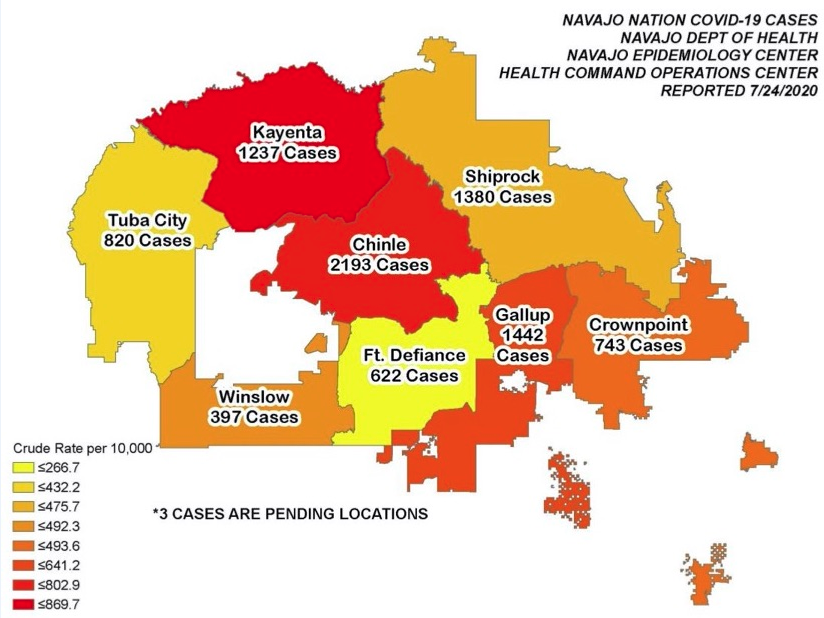
- Details
- By Native News Online Staff
WINDOW ROCK, Ariz. — On Saturday, the Navajo Department of Health, in coordination with the Navajo Epidemiology Center and the Navajo Area Indian Health Service, reported 69 new COVID-19 positive cases for the Navajo Nation and no recent deaths. The total number of deaths remains at 434 as previously reported on Friday.
Reports indicate that approximately 6,525 individuals have recovered from COVID-19. 76,902 people have been tested for COVID-19. The total number of COVID-19 positive cases for the Navajo Nation is 8,837.
Navajo Nation COVID-19 positive cases by Service Unit:
- Chinle Service Unit: 2,193
· Crownpoint Service Unit: 743
· Ft. Defiance Service Unit: 622
· Gallup Service Unit: 1,442
· Kayenta Service Unit: 1,237
· Shiprock Service Unit: 1,380
· Tuba City Service Unit: 820
· Winslow Service Unit: 397
* Three residences with COVID-19 positive cases are not specific enough to place them accurately in a Service Unit.
The Navajo Nation’s 57-hour weekend lockdown remains in effect until Monday, July 27 at 5:00 a.m. All businesses on the Navajo Nation are closed for the duration of the weekend lockdown. There will be another 57-hour weekend lockdown beginning on Friday, July 31 at 8:00 p.m. until Monday, Aug. 3 at 5:00 a.m.
“The data shows that the Navajo Nation has had under 100 new cases of COVID-19 on a daily basis for a month now, while cities and towns around us continue to contribute to the large increases of the virus in New Mexico, Arizona, and Utah. We have to remain diligent and continue safe practices to ensure that our numbers continue to flatten. Please stay home, wear your masks, practice social distancing, wash your hands often, and avoid large gatherings. Our health care experts are leading the charge and we have to keep listening to them and basing our decisions on the data that they provide,” Navajo Nation President Jonathan Nez said.
On Saturday, the state of Arizona reported 3,748 new cases of COVID-19, while New Mexico reported 324 new cases, and Utah reported 661 new cases. The Department of Health and the Health Command Operations Center is also preparing for the upcoming winter flu season, which will present more challenges, as well as a vaccination plan once a COVID-19 vaccine is proven to be safe and made available. The Nez-Lizer Administration also continues to develop and finalize a phased-in reopening of the Navajo Nation that will be implemented only when the number of cases decrease in each of the states and as long as the cases on the Navajo Nation decrease on a consistent basis.
To Donate to the Navajo Nation
The official webpage for donations to the Navajo Nation, which has further details on how to support the Nation’s Dikos Ntsaaígíí-19 (COVID-19) efforts is: http://www.nndoh.org/donate.html.
For More Information
For more information including reports, helpful prevention tips, and more resources, please visit the Navajo Department of Health’s COVID-19 website. To contact the main Navajo Health Command Operations Center, please call (928) 871-7014.
For up to date information on impact the coronavirus pandemic is having in the United States and around the world, visit the Worldometers website.
For up-to-date information about COVID-19, Native News Online encourages you to go to Indian Health Service’s COVID-19 webpage.
More Stories Like This
Native News Weekly (August 25, 2024): D.C. BriefsUS Presidents in Their Own Words Concerning American Indians
Monday Morning (December 22, 2025): Articles You May Have Missed This Past Weekend
Read What Our Year-End Campaign Donors Are Saying
Michigan Legislature Takes Action to Honor Civil War Native Sharpshooters
Help us defend tribal sovereignty.
At Native News Online, our mission is rooted in telling the stories that strengthen sovereignty and uplift Indigenous voices — not just at year’s end, but every single day.
Because of your generosity last year, we were able to keep our reporters on the ground in tribal communities, at national gatherings and in the halls of Congress — covering the issues that matter most to Indian Country: sovereignty, culture, education, health and economic opportunity.
That support sustained us through a tough year in 2025. Now, as we look to the year ahead, we need your help right now to ensure warrior journalism remains strong — reporting that defends tribal sovereignty, amplifies Native truth, and holds power accountable.
 The stakes couldn't be higher. Your support keeps Native voices heard, Native stories told and Native sovereignty defended.
The stakes couldn't be higher. Your support keeps Native voices heard, Native stories told and Native sovereignty defended.
Stand with Warrior Journalism today.
Levi Rickert (Potawatomi), Editor & Publisher

